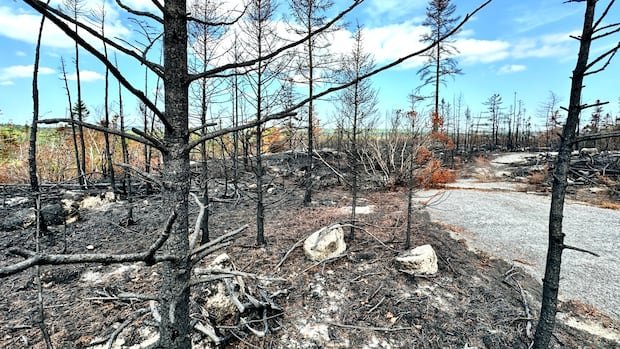The revenue generated from individuals in Nova Scotia who have been accused of violating the provincial burn ban falls significantly short of the total fines issued, totaling over $1 million. However, a criminologist sees promise in these statistics, indicating that the deterrent effect of substantial fines is proving effective for the government.
To date, only $118,869 has been collected, representing about 12 percent of the $1,010,537 in fines and fees imposed for unlawful burning over a span of two and a half years. Data from the provincial Justice Department reveals that 35 summary offense tickets totaling $25,000 were issued between 2023 and July 30, resulting in 16 convictions. When factoring in a victim surcharge and HST, the total fine amounts to $28,872.50.
Michael Boudreau, a criminology professor at St. Thomas University in Fredericton, expressed satisfaction with the fine collection efforts, acknowledging the challenges associated with enforcing such substantial fines. He emphasized the importance of individuals taking their fines seriously to avoid potential legal consequences.
The figures disclosed by the Justice Department exclude tickets issued for infractions related to the ban on entering wooded areas, which was implemented on August 5 and has subsequently been lifted in certain regions. The $25,000 fine for illegal burning was initially established in 2023 during severe wildfires in Shelburne and Halifax counties, leading to the destruction of numerous structures. This fine was temporarily reinstated through proclamation last year before being permanently enacted in May.
Despite receiving a ticket, individuals have several options for addressing it, including paying the fine upfront or contesting it in court. Ignoring the ticket is ill-advised, as failure to address it could result in arrest or other legal actions.
Boudreau highlighted the low yearly issuance of tickets as an indication that people are taking heed of the regulations. While he acknowledged the limitations of laws as deterrents to crime, he noted that financial penalties often influence behavior, even for those indifferent to the underlying issue.
Although the provincial government provided data on fines, a request for an interview was declined. Wayne MacKay, a professor emeritus at Dalhousie University’s Schulich School of Law, emphasized the need for transparency regarding the discrepancy between convictions and fine collections, as well as enforcement strategies to ensure compliance.
MacKay underscored the importance of imposing fines that individuals perceive as significant and enforcing them effectively to convey the seriousness of violations. He also cautioned against potential Charter challenges to the law’s proportionality in relation to the offenses.
In a recent incident, a Cape Breton man intentionally breached the ban on entering wooded areas to receive a fine, intending to contest it in court. Jeff Evely plans to challenge the fine in Nova Scotia Supreme Court with the support of the Canadian Constitution Foundation, with a scheduled hearing in February 2026.
Due to dry conditions, a provincewide ban on burning remains in effect until October 15 or until conditions improve, deviating from the usual burn restrictions between March 15 and October 15. For further inquiries on wildfires, smoke, or air quality, readers are encouraged to contact ask@cbc.ca.
The article also provides a breakdown of the tickets, convictions, and amounts collected for fire restriction violations over the past two and a half years. In 2023, 16 tickets resulted in nine convictions, with a total collection of $89,090. In 2024, 11 tickets led to five convictions, with $906 collected. As of July 30 this year, eight tickets resulted in two convictions, with $28,873 collected thus far.


